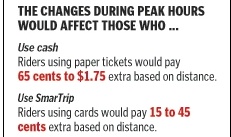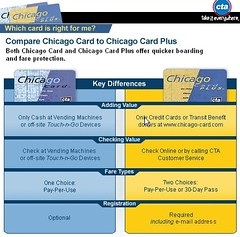Another concern about the WMATA fare increase proposals
If you were to ask me what I do, the quick summary is that I focus on these areas:
1. Urban (neighborhood and commercial district) revitalization;
2. Cultural heritage resources and tourism;
3. Transit (with an emphasis on marketing).
And I don't look at my issue areas as disconnected from one another. In fact, my strength is synthesis.
So the proposal within the WMATA fare increase suggestions to increase fares for cash users, in part directed towards intermittent users, especially tourists, troubles me.

The last thing you want to do is have people who don't know how to get around the city driving around, especially during rush hour. Maybe it's just another way to nail visitors. But I think it is counter-productive.
MTA did the same thing with MARC rail a few years ago. Before you could ride the train from/to DC and Baltimore for $9. After their rate increases, the highest price increase was for the occasional user (pass holders have big discounts over the one time rater) and the cost of a DC-Baltimore ticket is now $14.
-----------------------------------------------------------------------------------
London also instituted a price increase for their subway system that favors Smart Card holders (which tend to be residents) over temporary cards. Again, I think this is unreasonable. You want tourists to use the transit system and not to drive.
See "London Tube and bus fares set to rise" from The Independent. From the article:
He stressed that the aim was to persuade tens of thousands of people to buy pre-paid tickets rather than queue to buy one with cash. Almost 50% of Tube journeys and 40% by bus are made using the Oyster cards, but most of these are season tickets. Mr Livingstone said: "Too many people are paying cash, causing long queues at stations and on buses.
"Our objective is to move people away from paying cash, speeding up the whole system." Mr Livingstone conceded that the new single Tube fare of £3 would probably be the most expensive in the world but he pointed out that people could travel more cheaply if they bought the pre-paid card.
The Mayor said it was "bizarre" anyone should still buy a ticket with cash and it would be "more inexplicable" if that continued after January.
Also see "New round of rail fare increases angers passengers: Rises needed to improve services, say companies · Cheapest cash tube fare goes up 50% to £3" from The Guardian. The article has a nice summary of the changes, and a comparison of the cost of a single ride on various subway systems in other countries.
With a photocard, students can use London's Oyster Card for the utilization of student transit passes. Presumably the same could be done for senior discounts. And the system provides explanation of the smart card system in 13 languages other than English.
-----------------------------------------------------------------------------------
As far as the question of social equity is concerned, and people of lesser means tend to purchase transit cards as they go, rather than have a Smart Card (but I presume regular users do try to use passes--which provide significant discounts--regardless of income), there is no question that the WMATA fare increase proposals are based on what the Chicago Transit Authority did a couple years ago, (1) eliminating paper transfers between buses and between buses and rail (and therefore the discounts); and (2) moved to Smart Cards almost exclusively.
In fact, Heather Ferguson, a CTA financial and budget analyst, was a featured presenter at the WMATA-sponsored Regional Bus Conference a few weeks ago.
One of the things she did say though (and I am not sure that this is part of the proposal) is that when CTA moved to the Smart Card system, there were at least two periods when CTA provided Smart Cards to transit users at no charge, for promotional reasons and to address equity issues.

But even Chicago has two different versions of its smart card, and one form doesn't allow for the use of week- or longer passes to be used as part of the card. Frankly, the capability of being able to purchase a weekly pass within the Smart Card system, for cash, should be included in a DC-area transit smart card program.
Index Keywords: transit; tourism



0 Comments:
Post a Comment
<< Home